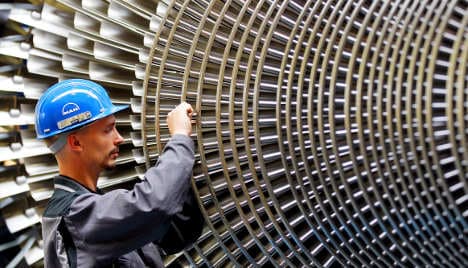Jobless rate hovers around 20-year low

Unemployment in Germany dropped slightly in April, hovering around the lowest level for about 20 years, official statistics showed on Thursday, as Europe's top economy continues to power ahead.
The seasonally adjusted unemployment rate was 7.1 percent, unchanged from the March figure, the Federal Labour Agency (BA) said. However, there were 37,000 fewer people looking for work than the same time last month.
This was exactly what economists surveyed by Dow Jones Newswires had forecast.
Market observers cheered the news. "The unemployment rate may fall further in the coming months," said Ben May, an analyst at Capital Economics.
"Germany's robust recovery is likely to continue for a little while yet," he added.
Another economist, Heinrich Bayer, from Postbank, said: "There's no end in sight to the upswing on the labour market," adding the goal of full employment in Germany was "more and more attainable."
On an unadjusted basis, the unemployment rate fell to 7.3 percent from 7.6 percent the previous month. There were 3.078 million unemployed in total, a drop of 132,000, the office said.
Frank-Jürgen Weise, the head of the BA, said: "The stable, positive trend on the labour market has continued with the economic upswing. Unemployment dropped further in April."
"The upturn on the jobs market is unstoppable," said Economy Minister Rainer Brüderle.
Labour Minister Ursula von der Leyen said the figures showed the job market was “as absorbent as a sponge” and the new rules giving workers from eight eastern European countries free rein in Germany was a “great opportunity.”
Nevertheless, the ranks of Germany's employed include a rising number carrying out so-called "mini-jobs", whose salary must be less than €400 per month.
There were nearly five million people in this position in April, a rise of 0.6 percent on the year, according to the BA. A further 2.4 million were doing a "mini-job" on top of another job.
Unions have criticised "mini-jobs", designed to serve as a springboard for the unemployed into a full-time job, saying that instead, it has led to an increase in low-paid work and a decrease in job security.
After suffering its worst recession in more than 60 years in 2009, the German economy has bounced back strongly, registering a record growth rate of 3.6 percent in 2010.
This year, Berlin expects the economy to grow by 2.6 percent this year, ahead of European rivals Britain and France.
AFP/DAPD/The Local/djw
Comments
See Also
The seasonally adjusted unemployment rate was 7.1 percent, unchanged from the March figure, the Federal Labour Agency (BA) said. However, there were 37,000 fewer people looking for work than the same time last month.
This was exactly what economists surveyed by Dow Jones Newswires had forecast.
Market observers cheered the news. "The unemployment rate may fall further in the coming months," said Ben May, an analyst at Capital Economics.
"Germany's robust recovery is likely to continue for a little while yet," he added.
Another economist, Heinrich Bayer, from Postbank, said: "There's no end in sight to the upswing on the labour market," adding the goal of full employment in Germany was "more and more attainable."
On an unadjusted basis, the unemployment rate fell to 7.3 percent from 7.6 percent the previous month. There were 3.078 million unemployed in total, a drop of 132,000, the office said.
Frank-Jürgen Weise, the head of the BA, said: "The stable, positive trend on the labour market has continued with the economic upswing. Unemployment dropped further in April."
"The upturn on the jobs market is unstoppable," said Economy Minister Rainer Brüderle.
Labour Minister Ursula von der Leyen said the figures showed the job market was “as absorbent as a sponge” and the new rules giving workers from eight eastern European countries free rein in Germany was a “great opportunity.”
Nevertheless, the ranks of Germany's employed include a rising number carrying out so-called "mini-jobs", whose salary must be less than €400 per month.
There were nearly five million people in this position in April, a rise of 0.6 percent on the year, according to the BA. A further 2.4 million were doing a "mini-job" on top of another job.
Unions have criticised "mini-jobs", designed to serve as a springboard for the unemployed into a full-time job, saying that instead, it has led to an increase in low-paid work and a decrease in job security.
After suffering its worst recession in more than 60 years in 2009, the German economy has bounced back strongly, registering a record growth rate of 3.6 percent in 2010.
This year, Berlin expects the economy to grow by 2.6 percent this year, ahead of European rivals Britain and France.
AFP/DAPD/The Local/djw
Join the conversation in our comments section below. Share your own views and experience and if you have a question or suggestion for our journalists then email us at [email protected].
Please keep comments civil, constructive and on topic – and make sure to read our terms of use before getting involved.
Please log in here to leave a comment.